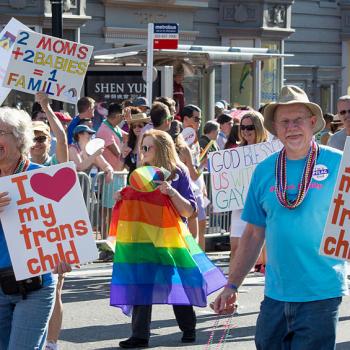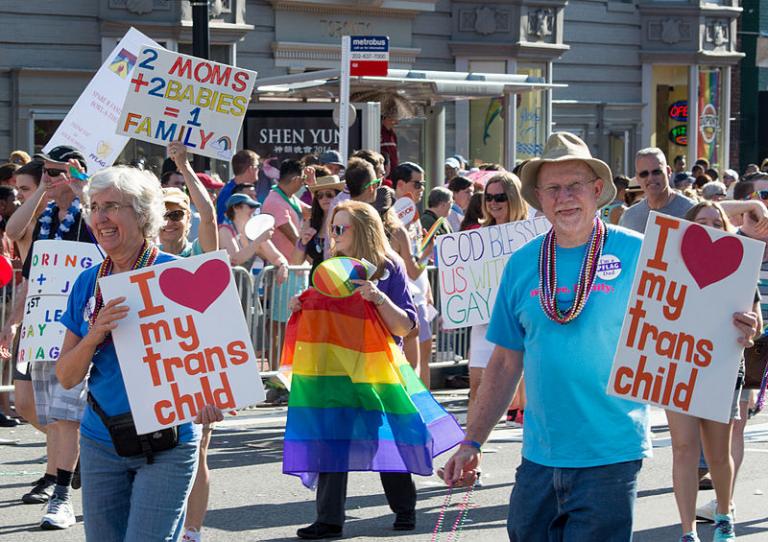
Hi there! Jane the Actuary asked some of us to fill in for her during a much-needed vacation, so I volunteered myself as tribute to write on a social issue. For anonymity purposes, I’m going by “Jane the Foster,” a reference to Marvel Comics’ lady version of Thor. I am neither a lady nor a Thor in real life—I just thought it would be apt to keep the “Jane” tradition going around here. My daughter is a fan of the character, anyway.
But speaking of cross-gender warriors, today’s topic will be “transgendered people in the military.” If I’ve learned anything in the last 48 hours, it’s this: despite less than one percent of Americans having any military service, everyone with a keyboard and a social media account suddenly has a perfectly-formed opinion on who should and shouldn’t be serving in the military. Seriously. Social media has been the most frustrating source of discussion on this hot topic, as people with absolutely no idea what they’re talking about are chiming in with opinions on fitness to serve, judicial review, Presidential authority, and a host of other things that are, well, wrong. Maybe what we need to do is clear up a few things before we seriously engage in discussion on this.
Look, let’s start first with a matter of perspective: opinions run hot on this issue. For better or worse, opinions and emotions aren’t fact and reason. You and everyone else has an idea of how you want this issue to turn out, but your conclusions are never a starting point in a logical discussion. They’re an endpoint. If you want to persuade someone, walk them through your argument and back it up with law, facts, and citations. I’m talking to everyone here. For purposes of this topic, I don’t care if your trans-friendly or traditionalist; Catholic or atheist; military or civilian; gay or straight.
So first of all, be honest in where you’re coming from. If you’re pro-transgender rights, or transgender yourself, you—tell me if I’m wrong–probably want to be accepted and validated by society, and you think that any rule which per-se excludes the transgendered is further evidence of a primitive, closed-minded bigotry that’s keeping you down. Even if you would never go near the military yourself (maybe you hate war; maybe you think the U.S. military is full of rapists and monsters), you can’t understand why everyone else doesn’t think like you. Therefore, your default assumption is going to be that any opposition to transgender military service is wrong and your arguments are going to move in that direction.
If you’re a traditionalist—probably an ardent Catholic or non-Catholic Christian, you think that transgenderism is a violation of the natural order. Men are men, women are women, and there’s both scientific and theological reasons you hold this position. And in the last twenty years, you’ve seen the world upended with new language and rapidly changing understandings of what used to be a very simple gender polarity. Suddenly, women can have penises and men can have babies, and you are told that you must accept this regardless of your opinions. You’ve been told that women with penises must be allowed to use mutual showers and restrooms with you, and that you may be a bigot if you’re heterosexual but not attracted to women with male parts. Therefore, your default assumption is going to be that any support for transgender military service is wrong and your arguments are also going to move in that direction.
The paradox of the military is that it exists neither for right-leaning America nor left-leaning America. It exists for America, period, a country which—last I checked—has a First Amendment which allows people to express all types of beliefs and opinions without fear of recrimination. The military “supports and defends the Constitution,” meaning that it’s—by nature—apolitical. Speaking as a veteran, I can tell you that many people in the military don’t like taking sides between categorically split sides of America. It’s a little sad when the service becomes caught in a tug of war between polar ends of thought. The military is here for both of them.
So anyway, with some healthy perspective in mind, let’s talk through the issue. About a year ago, the Department of Defense, under the Obama administration, formally opened the door for transgender people to openly serve and even receive transgender-related treatment in the process. The military began a year-long implementation process to figure out how to do this. Look, change in the military doesn’t happen overnight, no matter how much you think it should happen overnight. When the military finally declared that it was ending the women-in-combat bar in 2013, it still determined that it needed to determine how to integrate women into positions they’d never been in before. Job standards had to be established, berthing and bathing requirements had to be considered, and most of all, women’s safety of all things had to be established. The military is constantly worried about sexual assault, so you simultaneously have to allow women into a high-testosterone environment and figure out how to make sure they’re respected in a high-testosterone environment.
So, the transgender issue isn’t exactly a clean “let’s do this” decision either. If a transperson wants to go—pardon the expression—whole hog on a transition, it’s going to take time and money, and the military is simply not an environment where that’s a primary concern. People who have personal matters that disrupt their primary obligation—killing people and breaking things—are not exactly “all in” with the service. Consider: I’ve had a female military co-worker who was tasked to deploy for a year to the Middle East. Before she went, she became pregnant. I don’t know that she got pregnant to get out of the assignment, and I’m going to charitably assume that she didn’t. But that’s nine months of pregnancy and a few months of maternity leave where she suddenly couldn’t take that assignment, and somebody had to go in her place. This is allowed, but believe me, the system gets pissed when this happens. So yeah, a troop who presents as male and suddenly starts demanding new pronouns, new uniforms, and a few months off for surgery, is going to be disruptive. We could allow it the way we allow pregnancy, but there’s a cost, and the decision to integrate is not as simple as you’d like.
So, having said all that: as of Wednesday the 26th, President Trump—via Twitter—announced that transpeople couldn’t serve “in any capacity” despite over a year of DoD telling them they could. From the inside, I can tell you that this is confusing and perplexing. I could probably write about this at length, but here’s a few things to chew on.
- Nobody Knows What an “Order by Tweet” Means. The President is the Commander-in-Chief of the Military, and indeed, he runs almost every federal agency. While the President isn’t a king, he is someone with a lot of broad powers to run his agencies within the scope given to him by the Constitution. Still, these things are often done through very precise mechanisms—usually executive orders—where the President can give clear, unambiguous explanations of his intentions. It’s not a legal requirement: it’s just how it’s done.
Is an “order by Tweet” unlawful? No, probably not inherently so. Military orders can be verbal, written, or e-mailed. A lawful military order is one that’s heard, understood, and has a valid military purpose. I suppose that if the President tells Private Smith to be on post at 0600 via Tweet, that’s lawful. On the other hand, this is a considerably complex issue—capturing a military order of this magnitude in 140 characters is—understandably—going to raise questions. And if it leaves a lot of ambiguity, then it’s not really a valid order. At best, it’s a signal of a shift in policy, and the “order” will be clarified later.
- What does “transgender” mean? Stop right there. I’m sure that, on a gut check, you think “transgender” means “a person changing from male to female or vice-versa.” In reality, it can be a lot more complicated. Does the President’s tweet mean that he wants to remove anyone with gender dysphoria from the military? Because not everyone with gender dysphoria acts on it. What if they enjoy cross-dressing but aren’t sure if that means they actually want to be the opposite sex? What if they’re fairly certain they have gender dysphoria, but don’t have the diagnosis? What if they have the diagnosis, but they’re not under any clinical distress and are willing to continue to present as their birth gender under they separate or retire? What if they’re not taking hormones, but they’re experimenting with non-prescription, over-the-counter products known to induce feminization in males? What if they are taking hormones, but they don’t plan to have sex reassignment surgery? And what if they do any or all of the above, but at their own cost and on their own time?
When the military had a “don’t ask, don’t tell” policy, that was infinitely cleaner. If you openly identified as homosexual, committed a homosexual act, or engaged in a same-sex marriage, you were separated. That was easy. If we take seriously the notion that gender is a spectrum and transgenderism is a lot of things, then it’s going to be much, much more difficult to cleanly identify who’s barred and who isn’t.
- Military Accessions Are Not Retentions. When I flipped from active duty to the reserve, I learned the painful fact that joining the military is a very different standard from staying in the military. The military expects its troops to be healthy. People get sick and injured in the line of duty, and we’ll take care of them if something happens to them—particularly if it’s the service’s fault or it’s caused in combat. But coming in off the street with a preexisting condition? That’s not going to happen so easily.
When I was on active duty, I developed some superficial medical conditions. They didn’t interfere with duty and I passed my annual fit test just fine, so nobody cared. But when I switched to the reserve, it was like I was a stranger coming off the street, illnesses included. I had a heck of a fight with the reserve trying to convince them that I was healthy enough to serve in spite of my conditions…despite the fact that I’d been on active duty with no health problems.
What this means for the transgendered is that there’s a difference between trans-people who want to join and trans-people who have already joined. (Not everyone knows that they’re trans right away—many people figure this out later in life.) There’s a colorable case to be made against letting trans people into the military, because the military would be inheriting their psychological and medical issues. There’s a harder case with people already in, where the military has invested time and treasure into building those people up. Yes, there’s still cost, if we’re going to be paying for later-in-life trans-related issues, but the case against existing trans members just isn’t as clean as taking on new ones.
- Nobody Knows What a Court or Congress Will Do With This. The United States, believe it or not, has an adversarial system of government. We have three branches that are in a constant state of animosity. The President orders the military around, but Congress sets the laws and the budget. The President and Congress apply the Constitution as they understand it, but the courts might sometimes say that they’ve exceeded their constitutional mandate. Congress or the President might change course based on what the Judiciary has done. Sometimes the Judiciary defers to the military and admits it can’t make highly specialized decisions. Sometimes it doesn’t.
So Congress could, tomorrow, pass a law which requires the military to admit the transgendered. (Don’t ask, don’t tell was repealed by Congress, not the courts.) Or it might not.
The Courts are also an open-ended question. On the one hand, they have the power to strike down something that’s unlawfully discriminatory. Emphasis on “unlawful”—it might be “discriminatory” to deny service to people in wheelchairs, but there’s probably a good reason to not send people in wheelchairs onto the battlefield and a court wouldn’t touch that rule. But if the military decided to ban all Muslims, that probably wouldn’t fly. (Food for thought: should Catholics be barred from the military because they have allegiance to the Holy See, a foreign nation? Well, fortunately, they’re not—the military understands that our allegiance is to the Church, not the nationality.)
Transgenderism is going to be a tough argument for the courts on both sides. On the anti-side, the military is in the best position to judge who’s suitable for military service and who isn’t. If military service were a simple matter of “here’s a warm body,” then anyone could come in. But the courts recognize that the military is an insular, specialized society that does things the ordinary layperson doesn’t. A judge looking at the military in the abstract may not fully comprehend what service entails and whether a particular mental issue is going to interfere with that.
On the pro-side: trans people aren’t cookie-cutter. Some trans people are clinically distressed and a threat to themselves and others. (But so are any type of person!) Other trans people can and have faithfully served their country, and you’d never know gender identity was a service-limiting issue. A blanket rule keeping people out will unnecessarily keep the right people out, just as much as a blanket rule letting them in might bring in the wrong folks. To put it in military terms: this policy might be calling for napalm where a court could clearly see that a surgical strike would do. Plus, it’s pretty hard to argue with a straight face that DoD needs to exclude trans members where, just a week ago, we officially said the opposite. I would not want to be the attorney who defends the new policy in court.
- The military isn’t about you. This is my last point, even though I could probably keep writing here. The military is not, not, not about the individual. It’s about teamwork and conformity, not about individual acceptance and being able to prove yourself. This is why members wear uniforms and surrender certain rights while they’re serving. (For example, while civilian have free speech, a military member cannot lawfully be insubordinate to a superior, the President included.)
I am fine with justice qua justice, and if we were booting, say, black troops on the sole basis that they were black, that would be wrong and everyone should oppose that. If the case can be made that it is fundamentally unjust to exclude transgendered people on the basis of being trans, then they should be allowed to serve.
However, there is legally no right to serve in the military on an individual level. It may be a specific trans person’s lifelong dream to wear the uniform and defend the flag, but the uniform and the flag are much bigger than one person. A member who is making a case for admission to the military purely about themselves is kind of missing the point that there is no “I” in “team.”
When I tried to transfer to the Reserve, there was a good possibility that it wouldn’t have happened because of my medical issues. Everyone who assisted me agreed that the presumptive denial that I was getting was, on the surface, stupid, because I’d served for over a decade already in good health. I was very, very angry and disappointed when I was initially denied. At the same time, I didn’t have a lot of room to argue against it on any basis other than that I didn’t like the result. In my mind, the call was wrong…but it wasn’t my call. I thank God I finally made it in, but it wasn’t my call.
The point is: this issue has upset everybody on both sides of the aisle. But it’s tremendously more complicated than “let them serve” or “keep them out.” A simple solution is not coming tomorrow, and if you think you’ve got this all figured out because of some anecdotal stories you’ve read on Huffington Post or National Review…well, you probably don’t.
Good luck to everyone involved, and try to keep an open mind. And, for better or worse, God bless America.
Jane the Actuary here, getting ready for a final day at the beach. Thanks, Jane the Foster for a much better post on the topic than I could have written!
Image: Staff Sgt. Ashleigh Buch, an instructor with the 338th Combat Training Squadron at Offutt Air Force Base, Neb., looks out over the city of Omaha from her apartment Oct. 20, 2016. Buch is the first openly serving transgender Airman to be recommended for a return to flying duties. (U.S. Air Force photo/Senior Airman Rachel Hammes) ; http://www.offutt.af.mil/News/Features/Display/Article/998356/transgender-airman-flies-high-with-new-af-policy/















